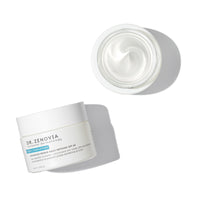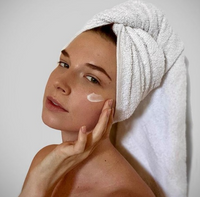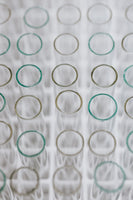Is Sugar Making Your Acne Worse? Exploring the Glycemic Index & A Low Inflammatory Diet

How Does Sugar Affect the Body
A diet high in sugar affects the inflammatory processes in the body which can manifest as acne and worsen inflammation. When sugar is ingested, the body metabolizes it which triggers an insulin spike in our bloodstream. Insulin is necessary for cells to use or uptake the sugar within the cell for energy. Our cells use receptors (which are specific keyholes sticking out of their membrane) for all molecules that control cell action. Insulin receptors on the cell membrane are necessary to ‘see’ insulin and cause sugar to rush into the cell. When we have a lot of insulin in our bloodstream, we tend to create more inflammatory mediators downstream.
This process leads to an increase of inflammation-producing enzymes that attach to and break down the skin’s collagen- referred to as glycation. Glycation increases the skin’s aging and can worsen skin conditions such as acne.
Understanding the Glycemic Index of Foods
Sugar affects the body because it is high on the Glycemic Index (GI). The higher the GI number associated with a type of food the faster insulin levels rise after consumption. Foods notoriously high on the GI include processed foods containing sugar and refined carbohydrates while low GI foods include leafy vegetables and citrus fruit. Sticking to a diet that consists of foods low on the GI will help regulate blood sugar and insulin levels and can decrease the skin’s inflammatory response.
How Foods Are Categorized on the Glycemic Index
Foods are categorized by a scale of 1-70+ on the Glycemic Index:
Low GI: 1 to 55
Green vegetables, citrus fruits, kidney beans, chickpeas, peanuts, lentils, and bran breakfast cereals are examples of foods with a low glycemic index
Medium GI: 56 to 69
Includes foods such as sweet corn, bananas, raw pineapple, raisins, popcorn, orange juice, oat breakfast cereals, and oat bran or rye bread
High GI: 70 and higher
Foods such as candy, white rice, white bread, and potatoes
The Benefits of a Low Inflammatory Diet for Acne
A low inflammatory diet is one low in sugar and low in animal proteins. The benefits of a low inflammatory diet include improved skin health and overall body function. Although diet is not necessarily the direct cause of acne, it can combine with other factors to worsen acne, especially if you are allergic or intolerant to an ingredient like dairy.
Sugar and animal products cause generalized inflammation in your body- inflammation is a major pathophysiologic aspect of acne. This inflammatory process adds to the work our bodies must do to repair the cellular stress we experience both endogenously and exogenously. The goal is to give our cells and body the best platform to function effectively, without stress and inflammation.
Therefore, implementing a low glycemic-index diet and eating low inflammatory foods including more vegetables, fruits, and plant-based proteins can have a significant impact on our skin and overall health.
Is Sugar the Cause of Your Acne?
There are many culprits to acne including hormonal fluctuations and excess oil production- sugar usually isn’t a lone cause. Acne is best treated with a comprehensive approach which includes a healthy diet and lifestyle, in-office skin treatments, prescription or over the counter topical products, and medication. It is therefore important to consult a board-certified dermatologist if you’re interested in clearing your skin.
Always remember, our skin is a visible indicator of internal body functions. What we put into our bodies can have a huge impact on the condition of our skin. Making healthy food choices and lessening your intake of refined sugar will complement any acne treatment or topical therapy.
Be sure to follow @drzenovia on Instagram to learn more about acne and hormonally impacted skin!









Leave a comment